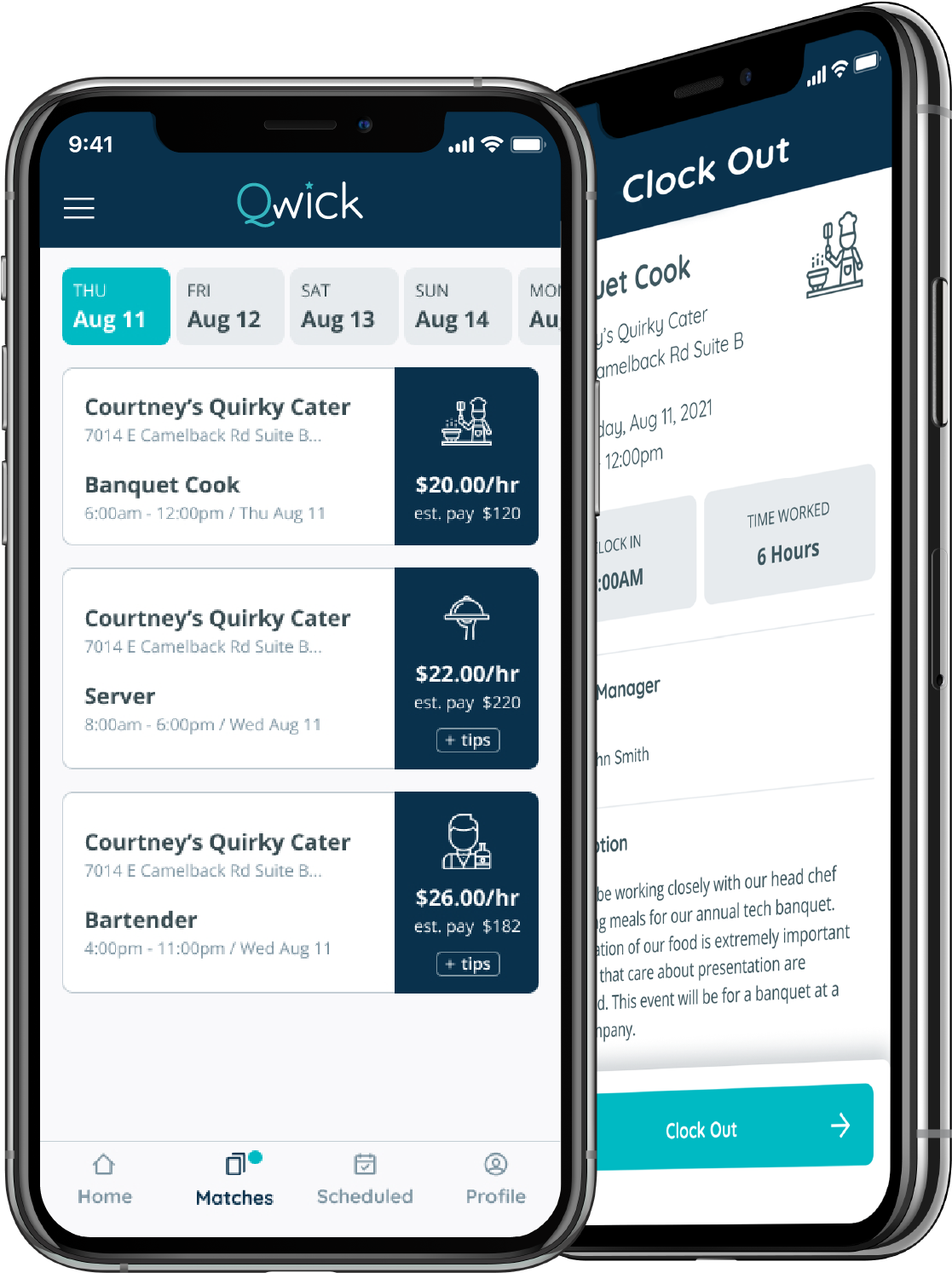Leisure and hospitality workers are departure at the highest levels of every industry. About 1 million left the labor force in November 2021 alone, according to the US Bureau of Labor Statistics. Why? Seasonality, low pay and monotonous work are among the reasons for the withdrawal from the hotel industry, as well as the feeling of a lack of career development.
So what should hospitality businesses do? Maybe turn to services like Qwick, a startup that finds hospitality contract workers. Qwick today announced that it has raised $40 million in a Series B funding round led by Tritium Partners, with participation from existing investors Album VC, Kickstart, Desert Angels and Revolution’s Rise of the Rest Seed Fund.
Jamie Baxter co-founded Qwick in 2017 with Chris Loeffler. Previously, Baxter was segment CTO of risk and financial services at Willis Towers Watson, where he led product and software development.
With Qwick, Baxter sought to build a platform that connects service workers with food and beverage shifts in real time. Qwick uses a matching algorithm that takes into account factors such as distance, availability of “VIP” workers and supply to fill gigs for hospitality businesses, including stadiums, senior housing and corporate catering.
“The hospitality industry has been plagued by a reputation for low retention rates, low wages and poor management and working conditions for decades,” Baxter told TechCrunch in an email interview. “Qwick aims to combat the problems of working in the industry and change what it means to work in hospitality by creating value for its professionals and offering them fair wages.”
To sign up for Qwick, workers must fill out a profile and watch a five-minute virtual orientation. Once verified, they receive notifications of open shifts.
“Qwick requires incoming professionals to go through an orientation, including a one-on-one interview,” Baxter said. “Before being granted access to the platform, all Qwick professionals are certified and vetted for experience, professionalism and commitment to service.”
Baxter also says Qwick uses a two-way five-star rating system to “ensure continuous quality and reliability between professionals and businesses,” although it should be noted that similar rating systems in gig markets have been found to worsen biases against minority workers,

Book gigs through the Qwick mobile app. Image Credits: Qwick
Qwick is similar to startups like Stint, Flexy, Indeed Flex, Gig, Limber and Baristas on Tap that provide short-term workers to businesses in a range of industries. Advocates of the platforms say they make hospitality a more financially viable profession by increasing job flexibility. But a recent Eater piece found that some workers at hospitality startups are making around the local minimum wage and may be forced to make long unpaid commutes. Critics say the platforms could leave businesses with less budget for recruitment and training, encouraging them to replace full-time positions with temporary work.
Some hospitality employers have signaled they are willing to take on temporary workers, potentially at the expense of salaried employees. In 2017 and 2018, Marriott and Hilton joined with Airbnb and the TechNet Coalition (which includes Uber, Lyft, and Taskrabbit) to lobby for a federal bill that would classify anyone who finds work through an online platform as an independent contractor.
Baxter counters the idea that Qwick is a powerhouse for sick people, arguing that it gives workers the “freedom” to work around their schedule.
“Thousands of business partners across the US rely on Qwick to end staffing shortages… [We] only partner with reputable firms known to treat their staff well and give agency professionals the freedom to work wherever and whenever they want,” said Baxter. “Hundreds of thousands of industry professionals have downloaded our app and signed up for shift work through Qwick.”
Qwick workers earn an average of $9 above the minimum wage in the cities where they work, Baxter added. He also noted that Qwick allows businesses to hire gig workers for traditional employment outside of the platform at no additional cost, unlike some gig work platforms that charge recruitment and hiring fees.
In any case, demand for Qwick’s service appears very robust on the employer side. After a difficult period during the pandemic – Qwick was forced to lay off 70% of the team and Baxter stopped taking a salary – the business has more than recovered, with revenue growing an astonishing 10,000% over the past three years, according to Baxter.
And for better or worse, the gig economy shows no signs of abating. The Pew Research Center reports that 16% of Americans have completed a job through an online gig platform. And Mastercard predicts that the number of global gig workers will grow to 78 million in 2023, up from 43 million in 2018.
Qwick is actively working with more than 7,000 businesses in 23 metropolitan areas, and the platform has facilitated more than 500,000 shifts to date, Baxter added.
Qwick investors, for one, seem confident in Qwick’s long-term trajectory, regardless of whether it leads to the best outcome for workers. In an emailed statement, Tritium Partners managing partner David Lack said: “Qwick’s impressive growth and history of achieving success through its innovative hospitality solution, even during some difficult years for the industry, show that the company has truly made a difference the way people work. ”
To date, Arizona-based Qwick has raised $69.1 million in capital. The company has a staff of just over 270 people, which Baxter says will expand to around 300 before the end of the year.

